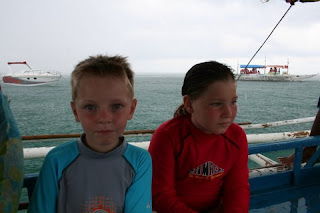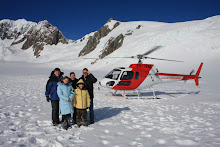chinese les / Chinese lessons

In mijn contract staat dat we taallessen mogen volgen om de plaatselijke taal leren spreken. We gaan het in ieder geval voor 20 lessen proberen.
 Sandra
SandraWe krijgen les met de hulp van Pinyin wat een vertaling naar Latijnse talen is van de Chinese karakters, en later gaan we het ook leren lezen en schrijven.
Als ik er wat meer verstand van heb zal ik proberen om het een en ander op de site te zetten.
In les 1 hebben we geleerd om hallo te zeggen en te vragen hoe het met iemand gaat en iemand voor te stellen.
Voor de echt geïnteresseerde:
Chinees ----------------------Nederlands
Nĭ hăo ----------------------- Hallo
Nĭ hăo ma? -------------------Hoe gaat het met jou?
Wŏ hĕn hăo,nĭ ne? ------------Met mij gaat het goed hoe gaat het met jou?
Yĕ hĕn hăo -------------------Met mij gaat ook goed
Zhè shì wŏ bàba / péngyou. ---Dit is mijn vader / vriend
 Lotte
LotteDe verschillende tekens boven de letters geven aan hoe je het uitspreekt, van hoog naar laag en weer omhoog, van laag naar hoog etc.
Denk nou niet dat we opeens Nĭ hăo ma? roepen als we je de volgende keer zien want het duurt nog wel een flink aantal weken, maanden of jaren voordat ik in het openbaar chinees durf te spreken

Last Monday Sandra and I had our first Chinese lesson, or better our first Puthonghua lesson. Puthonghua is the official Chinese language and is derived from the dialect they speak in the Beijing area.
My contract allows us to take lessens in the language of the host country to “improve” integration in the local community. This is where the first problem lies. The local community in HLY or in HK for that matter doesn’t speak Puthonghua. In Hong Lok Yuen we can manage perfectly with Dutch and English, and in Hong Kong English and the international sign language go a long way as most people in hong Kong speak Cantonese which is the dialect of this region.
Youri
But the kids get Puthonghua lessons at school and there is the tendency to teach Puthonghua in all Chinese schools and they speak it in mainland China, Singapore and Taiwan so we decided to at least try it for 20 lessons.
For Sandra who has a feeling for languages (she speaks 4 fluently) this will be easier than for me (I struggle in 3), and I must say it is not easy Chinese, even though more than a billion people speak it, it sounds like Martian to me.
So we were sitting at the dining room table with miss Lau, and repeating her pronunciation, Sandra got a compliment for here intonation, show off, and trying to follow the murderous pace.
Today we learned to say hallo, ask how people are doing and to introduce our father.
For those who really want to know
Chinees
Nĭ hăo -------------------------Hallo / G’day mate
Nĭ hăo ma? --------------------How are you ?
Wŏ hĕn hăo,nĭ ne? -------------I'm fine how are you?
Yĕ hĕn hăo --------------------I'm fine too.
Zhè shì wŏ bàba / péngyou. ----This is my father / friend
The signs on top of the syllables tell you how to pronounce it so from a high pitch to low an up again, from low to a high pitch etc.
Jelle
Forget about me saying Nĭ hăo ma? the next time we see each other. It will take more than a couple of lessons to give me the confidence to speak Chinese, but you never know.

















 Ondertussen lagen Jelle, Tanda (Jelles knuffel) en Lotte lekker te zonnen en hebben ze 's middags koekjes gebakken met Anita. Er zijn niet veel hotels waar dit nog kan, geweldig zo lekker relaxed.
Ondertussen lagen Jelle, Tanda (Jelles knuffel) en Lotte lekker te zonnen en hebben ze 's middags koekjes gebakken met Anita. Er zijn niet veel hotels waar dit nog kan, geweldig zo lekker relaxed.
































